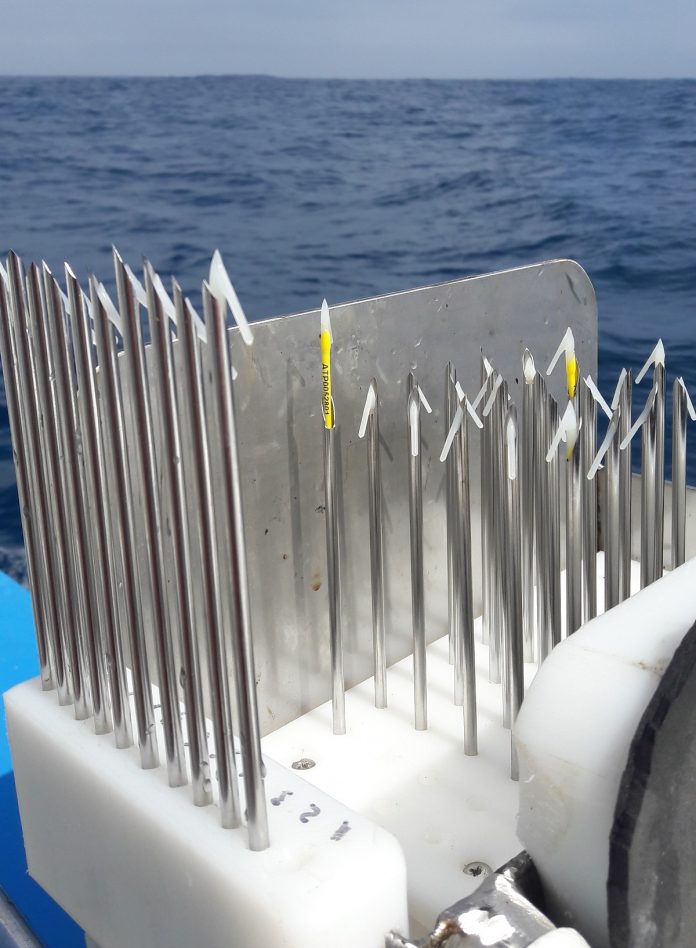Remember the days when in South Africa a can of solid pack light meat tuna was as stated on the tin, a block of solid tuna. In those days it was always yellowfin or longfin tuna, or a cheaper product was shredded tuna. These days the cheaper product, generally skipjack or smaller tuna and yellowfin offcuts appears on the shelves as “solid pack tuna” or “tuna chunks”. Will it be there in the future? The sustainability of the tuna resource is at risk thanks to rampant overfishing and a lack of political will.
Earlier this month the outcome of the special session of the Indian Ocean Tuna Commission (IOTC) was that no decision was taken on the rebuilding targets of the yellowfin tuna population.
Presently in an overfished stated of 20% below sustainable levels, the artisanal fisheries were instead blamed for a lack of science and data and a lack of ambition in overcall catch reduction targets.
A decision was taken to delay the matter until the IOTC’s annual meeting in June.
Overfishing of Yellowfin Tuna Back on the Table
Response
This enraged NGOs who have expressed bitter disappointment with the lack of tangible outcomes and the unwillingness of IOTC members to compromise sufficiently on the tabled proposals.
Marcel Kroese, global tuna lead for WWF, said: “Current data may be incomplete, but we know enough to know we have to do better, and we don’t have much time to get it right.”
The IOTC needed to agree to implement a rebuilding plan to recover the yellowfin tuna population within two generations (approx. 10-15 years), and time is fast running out for this to happen,” agreed Umair Shahid, WWF’s Indian Ocean tuna manager.
“We advocate caution for any fishery when it enters overfished status, particularly when – as is the case with Indian Ocean yellowfin tuna – there are aggravating circumstances such as high juvenile mortality, the largely uncontrolled use of fish aggregating devices and lack of accurate catch data. Without addressing these, we are on a countdown to stock collapse.”
Blue Marine Foundation blamed the IOTC Scientific Committee for failing to provide timely responsible management advice and instead called on member states to cutting catches to a level “at least below” 403000 tonnes.
It said for a stock that is overfished, the advice was not only insufficient but also irresponsible as it would not solve or reduce the overfished status of yellowfin but merely maintain it.
Jess Rattle, Head of Investigations at Blue Marine Foundation: said, “We are appalled by the tactics of the European Union which has abandoned common sense, empathy and the precautionary approach in favour of neo colonialism, hypocrisy and greed.
“We heard coastal states describe their fears of social and economic run should the stock collapse, heard the Maldives beg other members to act now while there is still time, heard Kenya admonish the EU, Korea and Japan for their unwillingness to reduce their use of drifting FADs to save the juvenile yellowfin – all of which fell on the deaf ears of developed, distant water fishing nations a and their local flag states of convenience.”
The government of the Republic of the Maldives said it was” alarmed by the lack of urgency and understanding demonstrated by a number of member states of the IOTC, and the lack of political will to address the matter”.
It called the Session “a lost opportunity to adopt a rebuilding plan to save yellowfin tuna stocks from overexploitation which would have been implemented in January 2022”.
Maldives Pole & Line Tuna Fishery Re-Certified
Supermarket commitment
In late 2020, several retailers and tuna suppliers publicly committed to reduce, cease or freeze sourcing of yellowfin tuna from the Indian Ocean.
Retailers Refuse Yellowfin Tuna, Sustainability Crucial
One of them was Tesco which, from the beginning of March, joined WWF in advocating for a Seascape approach to marine sustainability.
The retailer has set out a roadmap to transition to ecosystem-based fisheries management by 2030. The new approach will see Tesco work in partnership with its own brand suppliers from this year to introduce new due diligence processes within its tuna supply chain, helping them to achieve its goal of 100% MSC certification across its tuna ranges by 2025.
“Tesco’s decision to reform its tuna sourcing policy comes at a time when strong and coordinated efforts are required to ensure we have sustainable fisheries for future generations George Clark, MSC Programme Director UK & Ireland
A large range of Tesco’s wild fish and seafood products currently bear the MSC ecolabel and as tuna is one of the most popular seafood choices with shoppers, we welcome this commitment to 100% MSC labelling of tuna by 2025.”
Pledging sustainable tuna
The newest development is an invitation to signatories from responsible businesses throughout the tuna supply chain as well as governments and civil society organisations committed to sustainable tuna, to sign-on to the new 2025 Pledge towards Sustainable Tuna (25PST).
Jointly convened by the Global Tuna Alliance, Friends of Ocean Action and the World Economic Forum, 25PST is building on momentum generated by the Tuna 2020 Traceability Declaration, a public-private initiative convened by the World Economic Forum
This with a view to taking action to improve the environmental and social responsibility of tuna fisheries and the transparency of tuna supply chains.
Signatories to the 25PST commit to working towards a global tuna sector that meets the highest standards of environmental performance and social responsibility, through demonstrable improvements in supply chain practices and fisheries management.
Tuna is one of the most traded foods in the world accounting for at least USD42 billion of the USD150 billion annual global seafood trade, supporting millions of jobs and helping ensure food security for millions of people.
Long and complex supply chains can make it difficult for product information to be recorded accurately and consistently and shared throughout each step in the chain. Commitment and collaboration across geographies and sectors are needed to improve the tuna supply chain.
It also plays a vital role in the balance of ocean life and is a critical part of marine ecosystems. Unfortunately, tuna fisheries can result in incidentally caught bycatch species including seabirds, sea turtles, marine mammals, sharks and rays.
Human rights abuses
While there has been recent progress, some tuna stocks are being overfished and management decisions are too often based on short-term financial objectives.
Some tuna fisheries are also blighted by accusations of human rights abuses. Most tuna fishing takes place on the high seas, beyond the reach of enforcement agencies. Crew members can in some cases have limited or no safe access to communication methods, effective grievance mechanisms or access to remedy.
International migrant labour on tuna fishing vessels may be particularly isolated – not only physically at sea but also by language and culture – leaving them exposed to risk of abuse.
Says Ambassador Peter Thomson, UN Secretary General’s Special Envoy for the Ocean and Co-Chair of Friends of Ocean Action: “I strongly welcome the 2025 Pledge towards Sustainable Tuna and the clear commitment of leaders from a range of sectors to take better care of tuna fisheries globally.
“Improving fisheries management is a key focus of the Sustainable Development Goal for the ocean, SDG14, to conserve and sustainably use the ocean’s resources.
“We have to work together to ensure tuna fisheries are environmentally and socially responsible, from bait to plate, and I urge seafood businesses, governments and civil society organisations to join this important pledge,”
Replacing the Tuna 2020 Traceability Declaration
The 25PST replaces the Tuna 2020 Traceability Declaration, a voluntary statement that emerged from a dialogue among governments, businesses and civil society organisations convened by the World Economic Forum.
Spurred by the UN Ocean Conference in 2017, the Tuna 2020 Traceability Declaration was endorsed by 67 leaders of the world’s retailers, tuna processors, marketers, traders and harvesters, with the support of 21 influential civil society organizations and six governments.
The progress report published by the Global Tuna Alliance highlighted key achievements by the signatories on its completion, and 25PST will further build on this momentum.
All Global Tuna Alliance partners have signed onto the 2025 Pledge towards Sustainable Tuna.
“Partner companies of the Global Tuna Alliance have already shown serious commitment to a responsible tuna supply chain through improvements in their own operations and advocacy at Regional Fisheries Management Organizations,” says Dr Tom Pickerell, Executive Director of the Global Tuna Alliance.
“Our shared vision of tuna meeting the highest standards of environmental performance and social responsibility will be boosted by the 2025 Pledge towards Sustainable Tuna and I strongly encourage other business, government and civil society leaders to sign up and join the movement towards much greater sustainability.,”
While progress has been made in recent years, there remains much to do to improve tuna supply chains to ensure they are environmentally and socially sustainable, while being transparent and traceable.
The 25PST will play a crucial role in continuing to bring about improvements and has been registered as a voluntary commitment for implementation of the UN SDGs on the UN Ocean Conference website.
The Global Tuna Alliance will monitor progress of the signatories to the 25PST annually and report to the UN annually.
*Information supplied by Brian Cohen who previously owned Tuna Marine .




















[…] Sustainability of Tuna Questionable if Better Care Not Taken […]